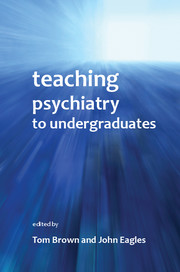Book contents
- Frontmatter
- Contents
- List of figures, tables and boxes
- List of contributors
- Preface
- Foreword
- 1 How do students learn?
- 2 Recent developments in undergraduate medical education
- 3 Undergraduate psychiatry teaching – the core curriculum
- 4 The organisation of undergraduate teaching
- 5 Assessment of undergraduates in psychiatry
- 6 Using computers to teach undergraduate psychiatry
- 7 How to give a lecture
- 8 How to do small-group teaching
- 9 Problem-based learning
- 10 Teaching trainee psychiatrists how to teach medical students: the Southampton model
- 11 Involving trainees in teaching
- 12 Involvement of service users in psychiatric education
- 13 Time-efficient clinical teaching
- 14 Intercalated degrees
- 15 Undergraduate experiences of psychiatry: a student view
- 16 Integration: teaching psychiatry with other specialties
- 17 Teaching the teachers in a cross-cultural setting: the Scotland–Malawi Mental Health Education Project
- 18 International undergraduate teaching
- 19 Teaching with simulated patients and role-play
- 20 Undergraduate medical education and recruitment to psychiatry
- 21 Choosing psychiatry: factors influencing career choice among foundation doctors in Scotland
- 22 Funding of the teaching of medical undergraduates
- 23 Dealing with students in difficulty
- 24 Training medical students to promote good mental health in secondary schools
- 25 Women in medicine
- Index
25 - Women in medicine
Published online by Cambridge University Press: 02 January 2018
- Frontmatter
- Contents
- List of figures, tables and boxes
- List of contributors
- Preface
- Foreword
- 1 How do students learn?
- 2 Recent developments in undergraduate medical education
- 3 Undergraduate psychiatry teaching – the core curriculum
- 4 The organisation of undergraduate teaching
- 5 Assessment of undergraduates in psychiatry
- 6 Using computers to teach undergraduate psychiatry
- 7 How to give a lecture
- 8 How to do small-group teaching
- 9 Problem-based learning
- 10 Teaching trainee psychiatrists how to teach medical students: the Southampton model
- 11 Involving trainees in teaching
- 12 Involvement of service users in psychiatric education
- 13 Time-efficient clinical teaching
- 14 Intercalated degrees
- 15 Undergraduate experiences of psychiatry: a student view
- 16 Integration: teaching psychiatry with other specialties
- 17 Teaching the teachers in a cross-cultural setting: the Scotland–Malawi Mental Health Education Project
- 18 International undergraduate teaching
- 19 Teaching with simulated patients and role-play
- 20 Undergraduate medical education and recruitment to psychiatry
- 21 Choosing psychiatry: factors influencing career choice among foundation doctors in Scotland
- 22 Funding of the teaching of medical undergraduates
- 23 Dealing with students in difficulty
- 24 Training medical students to promote good mental health in secondary schools
- 25 Women in medicine
- Index
Summary
Introduction
The relevance of this chapter, in a book which is primarily about teaching students and secondarily about recruitment into psychiatry, may not be immediately obvious. There are, however, several salient reasons for its inclusion. The number of newly qualified doctors who are women has grown significantly over recent years, and the number of women psychiatrists is likely to grow to an even greater extent, since women preferentially select psychiatry as a medical career. We thus predict a higher number of female readers than male readers of this book but, we hope, it will be helpful for all readers to have an understanding of the broader issues relating to women in medicine. More specifically, issues relating to women in medicine will pervade both teaching and recruitment strategies. More female psychiatrists will be teaching more female students with the expectation that identification and role-modelling will be of benefit to teaching, recruitment and career progression in the specialty.
Historical background
In ancient civilisations such as Egypt and Greece, women played a role in the healing professions, while in England in the Middle Ages nuns would provide care within convents and for their surrounding communities. A few women gained formal qualifications, for example at the famous medical school in Bologna. However, as medical training became defined through formal education and qualifications rather than apprenticeship, a professional medical monopoly developed and women were excluded. The female Scottish surgeon James Miranda Barry (1792–1865) qualified and worked in the Army Medical Service, in disguise as a man. During the 19th century there were demands that women be able to gain admission to the medical profession but medical schools and examining bodies refused to accept them.
Elizabeth Garrett Anderson (1836–1917) was inspired by the example of the first female American medical graduate, Elizabeth Blackwell (1821– 1910), and eventually succeeded in joining the medical register in 1866, via the Society of Apothecaries, after her father threatened to take the Society to court. Some British women obtained a medical education at universities on the Continent. Garrett Anderson and other pioneering women along with some male allies set up the London Medical School for Women in 1874.
- Type
- Chapter
- Information
- Teaching Psychiatry to Undergraduates , pp. 301 - 313Publisher: Royal College of PsychiatristsPrint publication year: 2011



